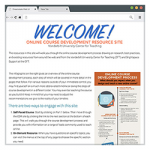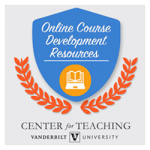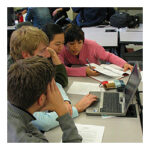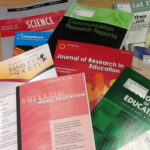Resource Category
New Guide on Project-based and Dynamic Collaborative Learning
Nov. 25, 2021—The newest addition to the CFT’s Course Development Resources (CDR) site, entitled Project-Based and Dynamic Collaborative Learning, is all about how instructors can design meaningful, effective group work through research-informed strategies and the intentional use of technology. The guide explores the research on collaborative groups and answers questions such as: How should we form groups? How can we effectively...
Junior Faculty Spotlight: Janelle M. Delle
Nov. 18, 2021—Each year, the CFT blog highlights the work of our Junior Faculty Teaching Fellows. This month, Janelle Delle, Nursing, talks about some of the lessons she has gained from the Fellowship. When I first began my teaching career 5 years ago, I had no idea what to expect of myself or the students, nor what...
Updated Guide! Dealing with the Unexpected: Teaching When You or Your Students Can’t Make it to Class
Nov. 12, 2021— If you find yourself considering the question of how to deal with attendance and participation this year, you will want to check out our newly updated guide “Dealing with the Unexpected: Teaching When You or Your Students Can’t Make it to Class”. The most recent update to this perennially useful guide takes into consideration...
Tweaking research presentations to foster community and knowledge construction: A focus on peer review
Nov. 10, 2021—by Cynthia J. Brame I recently got to watch a class session that taught me a new and very effective way to help students build their science identity by building a scientific community. It was awesome, and I can’t wait to figure out how to adapt it to one of my classes. Here’s the setting:...
Making the most of clinical conference courses: Adding a “pair and share” element to prompt student engagement and reflection
Nov. 4, 2021—by Cynthia J. Brame I recently had the opportunity to watch Janelle Delle, Assistant Professor of Nursing, run one of the clinical conferences that she has with small groups of students every week. The point of a clinical conference course is to help students make sense of and learn from their ongoing clinical experiences, a...
Promoting Persistence in STEM Learning Community: Resources and Reflections
Sep. 28, 2021—STEM disciplines have long been concerned with disparities between underrepresented and well-represented student groups and the associated “pipeline” problem, where underrepresented students are more likely to switch away from STEM majors. In 2020-2021, a group of about twenty faculty from eight departments met biweekly to consider ways to address this problem individually and collectively. Members...
Want to help your students avoid cheating? Consider this guide.
Sep. 22, 2021—The folks at EduMed have developed a guide to help students understand and avoid plagiarism and cheating. The title focuses on online students, but the breakdown of different forms of academic dishonesty and how to avoid them can be useful to all students. The descriptions of self-plagiarism, paraphrasing plagiarism, and mosaic plagiarism may be particularly...
CFT Opens New Digital Media Lab to Support Faculty
Sep. 20, 2021—The Digital Media Lab in the Digital Commons building at 1101 19th Avenue South provides guidance, instruction, and resources to all faculty, regardless of technology experience, who want to create and use digital media in their teaching. The digital media specialists at the DML can help faculty learn about video production, audio production, graphic design, and web design....
Lessons from a Journal Club: Investigating Student Learning – Post 3: Reasons for doing systematic inquiry and final reflections
Sep. 1, 2021—by Leah Marion Roberts, Senior Graduate Teaching Fellow Welcome to the final post in this series on systematic inquiry in teaching and learning contexts. This spring, Cynthia Brame and I facilitated a journal club looking at different ways to investigate student learning. In this blog series, I’m sharing some highlights of our collective learning,...
One of these things was not like the others: Experiences with standards- and specifications-based grading
Aug. 30, 2021—This guest blog post comes from Richard F. Haglund, Stevenson Professor of Physics. The following comments are reflections after a year of fruitful dialogue with colleagues in an on-line learning community sponsored by the Center for Teaching, organized and led by Cynthia Brame. What I experienced about grading in 2020-2021 is a significant difference...










